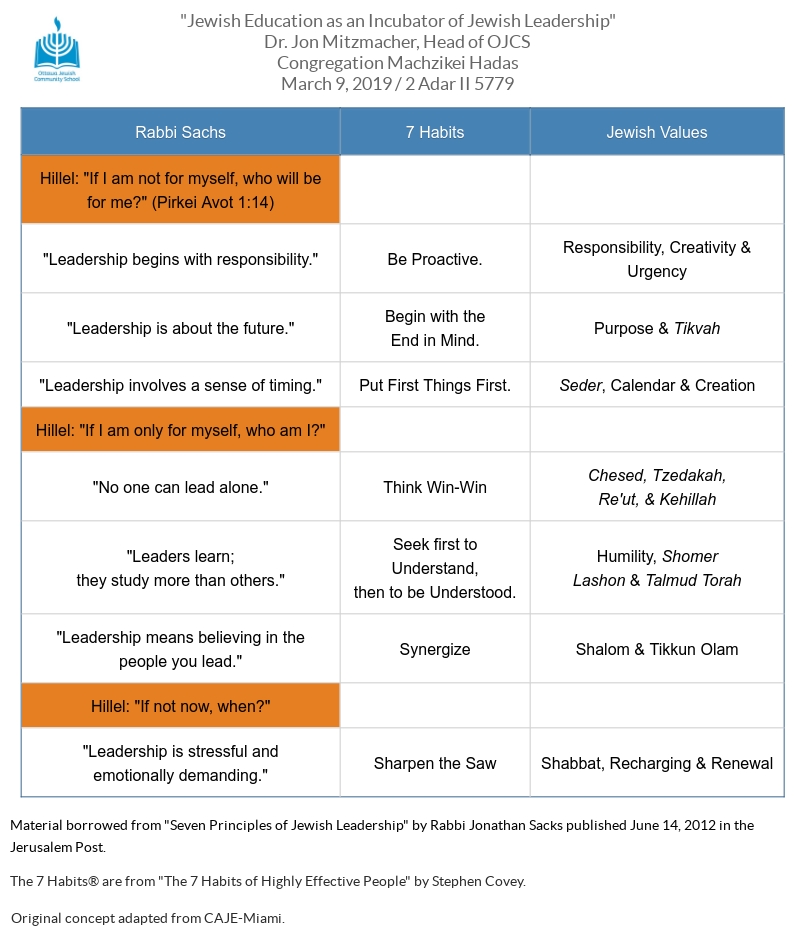What is “Jewish leadership”?
Does it refer to Jews who serve in leadership roles? Is it about Jews who lead in accordance with Jewish values?
The first is common; the second is rare.
We’ve been thinking about it a lot at OJCS. We have come to believe that Jewish day schools can serve as incubators for Jewish leadership because they have the opportunity to encourage and inspire both.
I had the privilege of addressing this topic last Shabbat when I spoke at Congregation Machzikei Hadas and it went well enough that I was encouraged to blog about it this week.

About three, four, years ago I had the opportunity to visit Donna Klein Jewish Academy in Boca Raton, Florida and I can still recall how each time we entered a new classroom, how a student would automatically pop up, come over, introduce themselves, tell us what was happening in the class, and then offer to answer any questions we may have. Class after class after class. No prompting from teachers. I further noted how each teacher had a personal mission statement on the doors of each classroom. The hallways were labeled in both Hebrew and English with each of the 7 Habits of Highly Effective People.
That was how I was first introduced to the “7 Habits”. I further learned how CAJE-Miami helped provide training for many of the Jewish day schools in South Florida to receive training in The Leader in Me – which helps schools bring the 7 Habits to life – and provided some Jewish value translation work to ensure they could live throughout the Jewish day school experience. And, with some stops between then and now, that is how it came to be that OJCS began prototyping its own version of the 7 Habits this year.
I have been blogging about the details of this prototype as we have introduced each new habit (and, yes, I am actually now one behind) and in preparation for last Shabbat I came across an article from Rabbi Lord Jonathan Sacks that helped me connect some dots. “Seven Principles of Jewish Leadership” is the title and the symmetry was too good to pass up. As a first step, I expanded upon a visual already created by CAJE-Miami and I created a visual that integrated Rabbi Sacks’ “Seven Principles” with the “7 Habits” with Jewish values. What I did conversationally, was link each of the “sevens” with Jewish text and real examples of what it looks like in a school or classroom. In a nutshell, I tried to answer the question of what happens when a Jewish day school moves Jewish leadership from the implicit curriculum to the explicit curriculum.
Here’s a graphic organizer to help you get oriented:

You may note that all of the “sevens” are further divided along Rabbi Hillel’s famous dictum from Pirkei Avot 1:14 (again borrowed from CAJE-Miami) – the first three focus on the individual, the second three on the relationship between the individual and community, and the final on, let’s say “timing”. So. How about we explore what this can look like in real life and in real classrooms?
- #1: For me, the relevant texts are the juxtaposition between the lack of responsibility taken by Adam in the Garden of Eden (the serpent made me do it!) and Cain (Am I my brother’s keeper?) and how Moshe responds when he sees a Hebrew slave being beaten or when he discovers Yitro’s daughters being harassed by shepherds. In terms of examples, in our school being proactive and taking responsibility lives in both formal structures like Knesset (student government) and informal structures like prototyping. Two recent examples come to mind. A member of Knesset pitched us on letting a student co-own the school’s Instagram account to make it more student-friendly. Also, the entire Grade 4 pitched us on allowing them greater access to student blogging:
The prototyping culture we are creating encourages and incentivizes students to take responsibility, to be proactive and in the parlance of our “North Stars” to truly “own their own learning”.
- #2: Here we look to Sefer D’varim (Book of Deuteronomy) in which during the last month of his life, Moshe sets out a vision and a set of laws to secure it. When we think at OJCS about the future, about “beginning with the end in mind,” we want our students to learn how to envision a future for themselves and then learn how to communicate and achieve it. We provide them with opportunities to develop these skills through a variety of student-led experiences with both high and low stakes. We collaboratively goal-set with each student around academic and behavioral outcomes, for example, as we head down a path that will likely end in student-led conferences (replacing parent-teacher conferences). We also provide students with opportunities to plan and run clubs such as our “Detective Club” and “Alien Club”.
- #3: Thinking about “putting first things first” and an overall sense of timing leads me to Rabbi Tarfon who said in Mishnah Avot 2:16, “It is not for you to complete the task, but neither are you free to desist from it.” In the life of school, this resonates with all the ways we are trying to help our students navigate time management and executive functioning. We now offer a Study Skills Elective each week. We offer twice-weekly Study Hall. We are looking at an Executive Functioning Boot Camp model for next year. We are looking at tools like Google Calendar and Google Keep. Another way we think about “putting first things first” is building on the success of our Middle School Retreat in helping create a sense of community and shared expectations for our middle schoolers each and every year.
- #4: This next one is a little dense, but is actually one of my favorite teachings about leadership. Rabbi Eugene Borowitz, a leading theologian and philosopher from the Reform Movement, wrote an article years and years ago in which he asserted that (religious) leadership should model itself on the kabbalistic notion of tzimtzum. “Tzimtzum” as described by Isaac Luria is the idea that in order to create the world, God had to contract Godself in order to make room for creation to take place. In other words, sometimes leadership is about making space for others to lead. These ideas are embedded in two of our North Stars – “We learn better together” & “We are each responsible one to the other” – and live in the commitment we have made to project-based learning and conflict resolution.
- #5: The Torah teaches that a king must write his own Sefer Torah which “must always be with him, and he shall read from it all the days of his life” (Deut. 17:19). Leaders learn. At OJCS, this lives in the North Star of “A floor, but no ceiling,” and in our emphasis on personalized learning. This year we are prototyping “Genius Hour” projects as just one example of letting students lead with their passion and letting their passion lead to their learning. In terms of “seeking first to understand and then be understood” we are working with JFS to provide “Kindness Workshops” to our students to help them skill-build towards active listening.
- #6: Here I am going to quote directly from Rabbi Sacks in his article when he says, “One of Judaism’s greatest insights into leadership: The highest form of leadership is teaching. Power begets followers. Teaching creates leaders”. We provide our students with lots of opportunities to learn through teaching and to learn leadership skills by “owning their learning”. Whether it is a Grade 6 WE Day project, leading a Rosh Chodesh assembly, designing a Hebrew Escape Room or interviewing residents at Hillel Lodge, our students develop the skills to see projects through, to dream dreams, to speak publicly, and to organize. These are all the building blocks of leadership.
- #7: There are no shortage of examples of stressed out and overwhelmed leaders in the Bible. Moses, Elijah, Jeremiah and Jonah – just to name a few – all at some point prayed to die rather than carry on as a Jewish leader. That is certainly an extreme example of the toll leadership can take, but we acknowledge that stress is very real for our students and families. It is partly why one of our North Stars is “Ruach” – we have intentionally and explicitly named joy and spirit and wellness as a guiding value in our school. Studying in school (and teaching!) is supposed to be joyful. We do our best to provide wellness and mindfulness into the school day. It is why we remain committed to Art, Music and PE as part of a well-rounded experience. Students deserve to feel successful and joyful and not each student is going to find that in the traditional academic subjects. It is why we have a “Ruach Week” and a Middle School Retreat. It is also why we are looking at advisory and guidance models. The emotional and spiritual wellbeing of our students is important for them as human beings, and as future leaders.

We cannot take for granted that what was once true will always be true. It has been true for generations that the leaders of Jewish organizations, schools and synagogues have come from the ranks of Jewish day schools; and flourished as a result. If we want that to continue – if we want to secure the Jewish future – our schools will need to work to make what was once implicit, explicit. Jewish leadership requires Jewish leaders who know how to lead – not just as Jews, but Jewish-ly. Ken y’hi ratzon.

